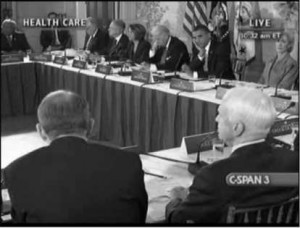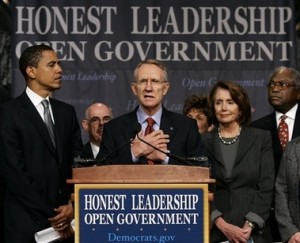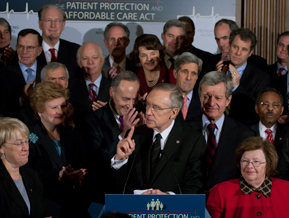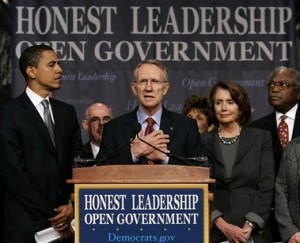
CentristNet Offers Its First Opinion Piece Regarding the Elements of Centrist Health Care Reform That President Barack Obama and Congressional Republicans Can Agree Upon at the Health Care Summit
As the hours count down to the beginning of the vaunted health care summit in Washington, in our opinion, there are many areas in which President Barack Obama and Congressional Republicans can agree to move forward with significant, yet incremental reforms to the American health care system. Most, if not all on the left argue that only a comprehensive, federal government-centered health care plan, like Obama’s Health Plan as released Monday, can reduce the cost of health insurance, reduce the number of uninsured, improve patient outcomes and contain projected massive federal deficits from present health entitlement programs like Medicare and Medicaid. Indeed, as President Obama and many Congressional Democrats repeatedly state, a comprehensive federal health care reform plan has been the ultimate goal of the left for many decades. Some, but not a majority on the right argue that there is no need for health care reform at this time. The views of the left and the right, as outlined above, are incorrect and an pivot from the present trajectory of health care debate towards centrist health care reform is the appropriate policy choice, as we will detail below.
As the developments this week make clear, with President Obama planning to use reconciliation to push through his left-leaning Obamacare and Congressional Republicans calling for a fresh start to the bill writing process on a blank piece of paper, the prospects for a bipartisan deal from tomorrow’s summit look slim. The just-leaked smaller Obama plan, if the leak proves accurate, could run into similar troubles, as a key concern of many Americans is the increased federal bureaucracy envisioned by each of his plans. Indeed, the actual overall cost of the Obama Health Plan and the various arguably misleading claims made on Obamacare’s behalf have not inspired confidence in President Obama’s handling of health care, which fell to a mere 35% approval (and 55% disapproval) in the last CBS/NYT poll. Instead of giving into pressures from party ideologues on both sides, we hope that President Obama and Congressional Republicans put aside partisanship and the zero-sum calculus of political warfare to actually consider some centrist health care policies that can be quickly passed, this year, with bipartisan support.
Obama’s present strategy to use reconciliation to pass Obamacare through the Senate after passing the present Senate bill through the House of Representatives has no guarantee of success considering the present bills’ massive unpopularity with the American public and the reluctance of House Democrats to make a career-ending vote for Obamacare. Further, a new entitlement passed without bipartisan support would be difficult to maintain in years to come and could poison American politics for a generation. With all that in mind, we offer several straightforward centrist policy prescriptions that the GOP and Obama can agree on. Each centrist incremental federal reform could be worked out between the parties in a matter of weeks, perhaps by fast-tracked policy commissions with an equal split in members between the parties and tasked with producing preliminary reports two weeks from the end of the summit.
1. Federal Incentives To Encourage States to Decrease the Number of Involuntarily Uninsured Americans.
A large part of the issue that many Americans have with Obamacare is the central role of the federal government in the regulation and operation of the American health care industry, with numerous new federal bureaucracies, and attendant federal health bureaucrats to be added to the payroll, that is at the heart of the design of Obamacare. We believe that instead of creating a giant new federal government structure, federal policy should focus on incentivizing the states into experimenting with new measures to reduce cost and the involuntarily uninsured. New federal mandates to states, as are included in Obamacare, would inappropriately constrain the states and hamper the great “laboratory of democracy” from properly operating as it has throughout American history.
While we don’t agree with everything, or even most, of what the Robert Wood Johnson Foundation (“RWJF”) advocates, RWJF’s recent report on the health care “State of the States” appropriately highlighted the key role of the states in finding health care solutions:
States play a critical role in advancing coverage expansions and other health reforms by testing new ideas, both politically and practically. Because health care delivery is largely local, states are closer to the action when it comes to implementing some of the delivery and payment systems changes that are needed to truly transform the health care system. This proximity and flexibility in system redesign is a key strength for states. In addition, states have first-hand knowledge of their local landscape and relationships with the stakeholders that will be necessary to change the system. Much of the work related to implementing insurance reforms, delivery system redesign, and public health strategies traditionally have been led by states.
Some say that the Massachusetts health care plan was a failure because health care costs are rising faster in that state than nationally since the reform passed, the cost overruns regarding projected state spending and the lack of attainment of true universal coverage. However, the State of Massachusetts passed a bipartisan plan with Republican Governor Milt Romney, a 90% Democratic Massachusetts legislature and a cheerleading Teddy Kennedy present for the signing of the bill by Romney. If Massachusetts desires to change or reverse its programs, the people of Massachusetts will make that happen. Every other state in the Union should have the same opportunity to decide how to proceed regarding its health care systems and the federal government should not straight jacket the states into a one size fits all federal mandate via Obamacare. Federal incentives could also be accessible to several states who wish to forum a regional health care system with uniform rules – but the decisions effecting Americans health care should not be left to a faraway bureaucrat in Washington, D.C.
By maintaining the flexibility of states to engage in policy innovation, the probability increases that a health care policy that is proven to work by empirical evidence will emerge and spread around the country once the benefits of such policy are made clear by results. Creating a huge federal bureaucracy with many new mandates on state governments regarding health care policy will stifle this state innovation and risk damaging the present high quality of care provided by American medical professionals across the land. As 70% to 80% of Americans approve of their present health care arrangements, federal health policy must follow the medical maxim of “first do no harm” and avoid the risk of reducing the present quality of care with too much federal government control over states and medical professionals.
2. Reform Medical Malpractice Laws:
There is no serious dispute over the need for substantial medical malpractice reform, or tort reform, on the federal level. Some on the right advocate Texas-style tort reform, which involves caps on damage awards and limiting “jackpot justice”, while some on the left wholly reject any tort reform and others advocate a system of specialized health care courts to replace the present courts of general jurisdiction that handle medical malpractice cases. Both policy approaches have pluses and minuses, and to that end the federal health reform effort should provide incentives to the states to attempt either systemic change. It may be that in the long term, specialized health courts, similar to the workers compensation system, are the better choice, but the states should be free to choose how to design their system, as they are in the workers compensation arena. The left-leaning Progressive Policy Institute outlines some benefits of health care courts:
A Better Way: Health Courts
There are many proposals for health care reform that are focused outside the medical justice system. All are well intentioned and some may be practical, but without legal reforms none will likely succeed in containing costs. Clearly, we need major reform, and we can achieve it in part by instituting a network of specialized health courts to replace the current medical justice system.1
Under health courts, malpractice cases would no longer be heard in civil courts. Instead, they would be handled in an administrative system overseen by the states. The system would be similar to the state-run workers’ compensation system. It would give more injured patients access to quicker and less expensive justice.
….
Health court rulings would establish new standards of practice to cover medical circumstances for which common standards have not previously been settled. The health court system would thus yield an essential benefit that our current system of medical justice fails to provide: consistent, rational rulings that send clear signals to health care providers about what constitutes good medical practice. In so doing, it would help eliminate the legal uncertainty that encourages doctors to practice defensive medicine and the silence among practitioners and patients that very likely contributes to medical errors.
It is possible that if even a few states chose to institute health care courts based on incentives in an incremental, centrist federal health reform plan, the benefits of such specialized courts could become empirically proven in a few years. Once proven successful, such a system may become the standard throughout the country; however, as far as a federal policy is concerned, a state should be free to try traditional tort reform, health care courts or any other solution they can create. A federal plan to incentivize the states in the tort reform arena could not be seriously opposed by either party and legislative language could be worked out relatively quickly by bipartisan negotiators.
3. Create a Federal/State/Insurance Companies Mechanism for Covering the Uninsurable with Preexisting Conditions:
The American public believes by a large majority that some federal action should be taken to assist those Americans who cannot obtain health care insurance because they have an uninsurable preexisting condition. Indeed, logically speaking, requiring an health insurance company to provide insurance to an individual that faces certain, and substantial, medical expenses is similar to requiring a car insurance company to provide insurance to an individual with an already wrecked car. It is simply not economically feasible for the private sector insurers to insure against an already existing condition. Because of this, federal government intervention in the health insurance market is appropriate in the instance of uninsurable individuals.
A centrist proposal to deal with uninsurable individuals is to set up comprehensive high risk pools jointly funded by federal and state governments to enable uninsurable individuals to purchase health insurance and a supporting, pro bono role for health insurance companies in administering the program. 31 States presently have high risk pools, and the inclusion of the federal government and insurers into a comprehensive risk pool policy could reduce the cost to the uninsurable while providing folks with care they otherwise would not have received. Both parties already support the use of risk pools, and the Senate version of Obamacare provides for high risk pools between now and 2013. Health insurance companies should be required to participate in this program as a consequence of the federal law, perhaps conditioning a continued exemption from antitrust laws on cooperation by the insurance companies with the risk pool program. This will be an expensive proposition, and many on both sides of the aisle could object to the high cost and some on the left are sure to argue that a comprehensive health care reform plan would be a cheaper alternative. However, as noted earlier, there is no chance of a bipartisan agreement on a comprehensive health care reform plan this year, but neither party could seriously oppose a serious risk pool program for uninsurable individuals and again, the details of this policy could be worked out in a matter of weeks.
4. Create Bipartisan Commission to Study Medical Billing Reform:
Anyone who has reviewed medical bills as provided by doctors and hospitals and then reviewed the payments actually made, and their variance, between insurance companies, government entities and cash-paying individuals knows that the present medical billing system needs substantial reform. Unfortunately, this issue has gotten little attention in the health care reform debate and does not figure prominently in the Obama Health Plan. A single procedure can be billed at $10,000.00 by a hospital to an individual, yet the same procedure could bring in only $4,000.00 from an insurance company and either more or less from a government entity. Greater transparency is needed in medical billing, and health care consumers need to be more involved and aware of what procedures cost and their various choices to create a more efficient and effective medical billing system. While this policy prescription may not be amenable to a quick bipartisan agreement on legislative mandates, neither party could seriously oppose the creation of a Bipartisan Commission to study the medical billing problem and issue recommendations for negotiations between the politicians in a few months.
5. Create a Medicare/Medicaid Sanctions Database and Act to Reduce “Waste, Fraud, and Abuse” in Medicare and Medicaid:
One provision proposed by the Obama Health Plan on Monday was originally proposed by the Republican Study Committee:
The President’s Proposal establishes a comprehensive Medicare and Medicaid sanctions database, overseen by the HHS Inspector General. This database will provide a central storage location, allowing for law enforcement access to information related to past sanctions on health care providers, suppliers and related entities. (Source: H.R. 3400, “Empowering Patients First Act” (Republican Study Committee bill))
Republicans will also likely sign off on some of the other provisions listed on this page by President Obama in his Health Plan, as some are geared towards cracking down on wrongdoers who abuse the payment procedures of Medicare and Medicaid. A good first step, and one that neither party could seriously object to, is the creation of the sanctions database to make sure wrongdoing individuals cannot continue to defraud the government under any circumstances. Again, bipartisan negotiators could work out legislative language on this issue in a matter of weeks.
Many seniors are understandably nervous about what exactly it means for them if Obamacare passes and over 400 Billion Dollars in reductions in Medicare spending occur over the next ten years. A more sensible, bipartisan policy would focus intensely on increasing efficiency in Medicare/Medicaid while reducing waste, fraud and abuse in this programs instead of cutting whole programs like Medicare Advantage, a program relied upon my millions of seniors. Another constructive step would be for President Obama to appoint a Medicare administrator to report to him and Congress about what kind of cuts are feasible or desirable beyond eliminating the improper, fraudulent spending via the sanctions database and stepped up enforcement.
CONCLUSION
The five point plan listed above is no panacea, and will not solve all the problems in the American health care system. However, these above-enumerated centrist health care reforms could not be seriously opposed by either party and compromise legislative language could be worked out in a matter of weeks. Instead of acrimony about Obama’s planned use of reconciliation and the GOP’s obstructionism, one can only hope that the participants in today’s health care summit put aside the pressures of party ideologues on both sides and decide to forge real consensus where it is actually possible: centrist, incremental health care reform.
Update: The initial speeches by President Obama, GOP Senator Lamar Alexander, House Speaker Nancy Pelosi and Majority Leader Harry Reid show little sign of true bipartisan negotiations.
Technorati Tags: American Health Care, American Health Care System, Barack Obama, Blank Piece Of Paper, Congressional Democrats, Congressional Republicans, Federal Bureaucracy, Federal Deficits, Federal Health Care, Fresh Start, Health Care Debate, Health Care Industry, Health Care Plan, Health Care Reform, Health Care Summit, Health Care System, Health Plan, Incremental Reforms, Legitimate Role, Patient Outcomes, Policy Choice, Writing Process, Zero Sum







